Free Trade's Influence on the Global Business Environment Today
VerifiedAdded on 2023/06/07
|5
|825
|459
Essay
AI Summary
This essay explores the impact of free trade on the global business environment, particularly in light of recent trade policies. It examines the consequences of tariffs imposed by the US, highlighting the adverse effects on industries and economic growth. The essay contrasts these protectionist measures with the benefits of free trade, referencing the World Trade Organisation and various free trade agreements like the Australia-China FTA. It uses examples such as China's rise as a manufacturing hub and Australia's dependence on Chinese demand to illustrate the positive impact of free trade on economic development. The analysis concludes that free trade plays a significant role in economic growth, advocating for proactive measures to encourage it, especially in light of the potential negative impacts of trade wars.
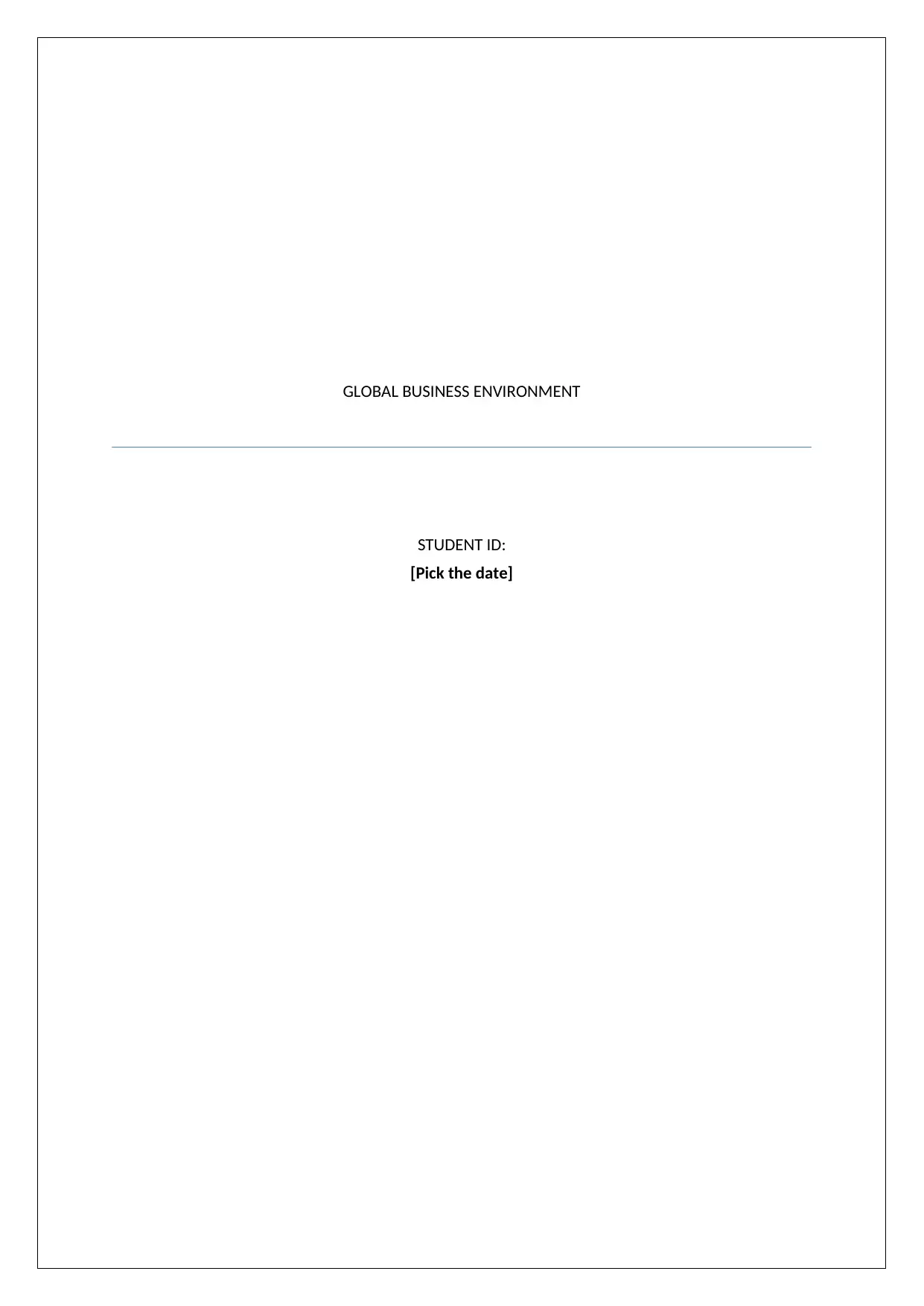
GLOBAL BUSINESS ENVIRONMENT
STUDENT ID:
[Pick the date]
STUDENT ID:
[Pick the date]
Paraphrase This Document
Need a fresh take? Get an instant paraphrase of this document with our AI Paraphraser
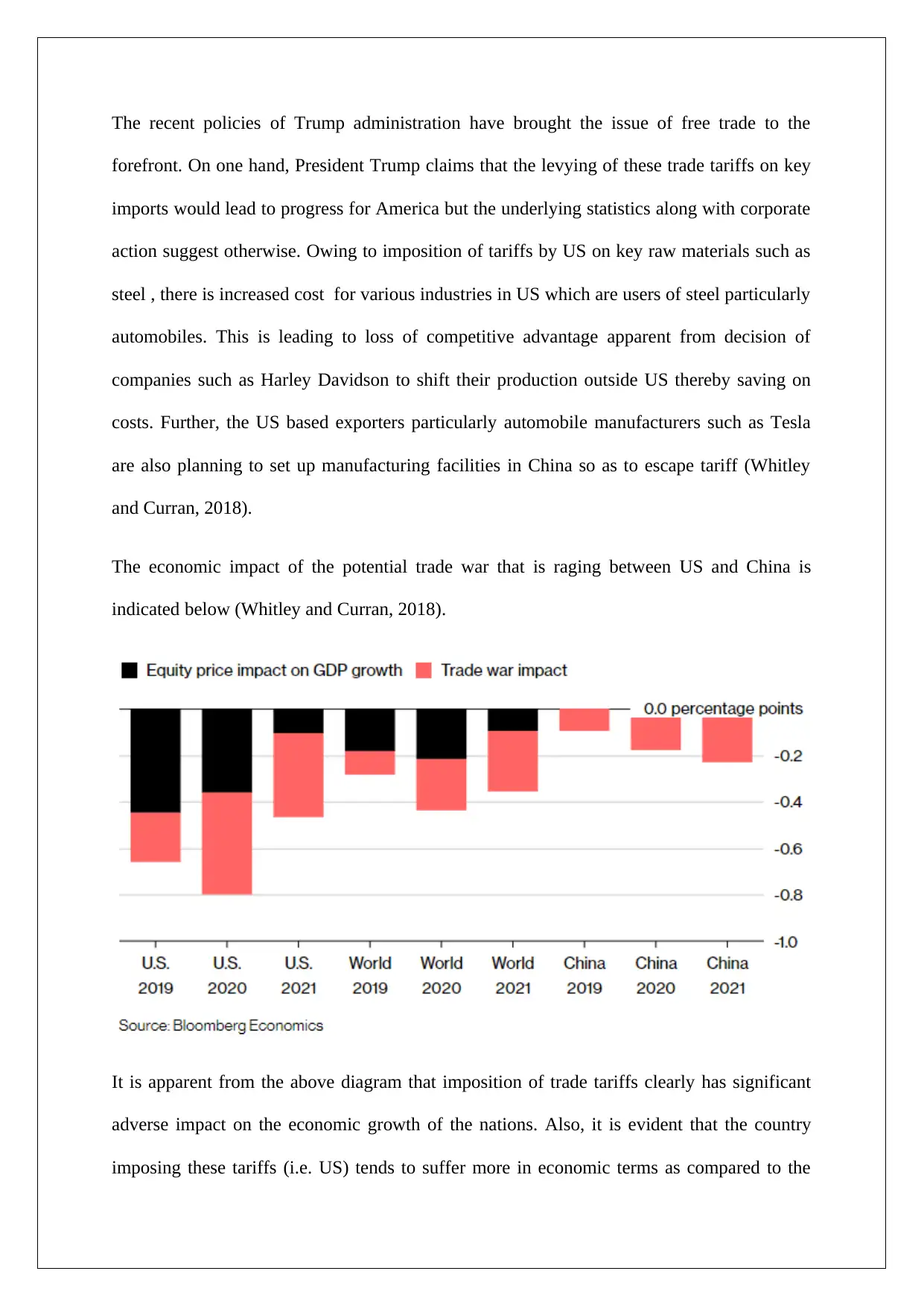
The recent policies of Trump administration have brought the issue of free trade to the
forefront. On one hand, President Trump claims that the levying of these trade tariffs on key
imports would lead to progress for America but the underlying statistics along with corporate
action suggest otherwise. Owing to imposition of tariffs by US on key raw materials such as
steel , there is increased cost for various industries in US which are users of steel particularly
automobiles. This is leading to loss of competitive advantage apparent from decision of
companies such as Harley Davidson to shift their production outside US thereby saving on
costs. Further, the US based exporters particularly automobile manufacturers such as Tesla
are also planning to set up manufacturing facilities in China so as to escape tariff (Whitley
and Curran, 2018).
The economic impact of the potential trade war that is raging between US and China is
indicated below (Whitley and Curran, 2018).
It is apparent from the above diagram that imposition of trade tariffs clearly has significant
adverse impact on the economic growth of the nations. Also, it is evident that the country
imposing these tariffs (i.e. US) tends to suffer more in economic terms as compared to the
forefront. On one hand, President Trump claims that the levying of these trade tariffs on key
imports would lead to progress for America but the underlying statistics along with corporate
action suggest otherwise. Owing to imposition of tariffs by US on key raw materials such as
steel , there is increased cost for various industries in US which are users of steel particularly
automobiles. This is leading to loss of competitive advantage apparent from decision of
companies such as Harley Davidson to shift their production outside US thereby saving on
costs. Further, the US based exporters particularly automobile manufacturers such as Tesla
are also planning to set up manufacturing facilities in China so as to escape tariff (Whitley
and Curran, 2018).
The economic impact of the potential trade war that is raging between US and China is
indicated below (Whitley and Curran, 2018).
It is apparent from the above diagram that imposition of trade tariffs clearly has significant
adverse impact on the economic growth of the nations. Also, it is evident that the country
imposing these tariffs (i.e. US) tends to suffer more in economic terms as compared to the
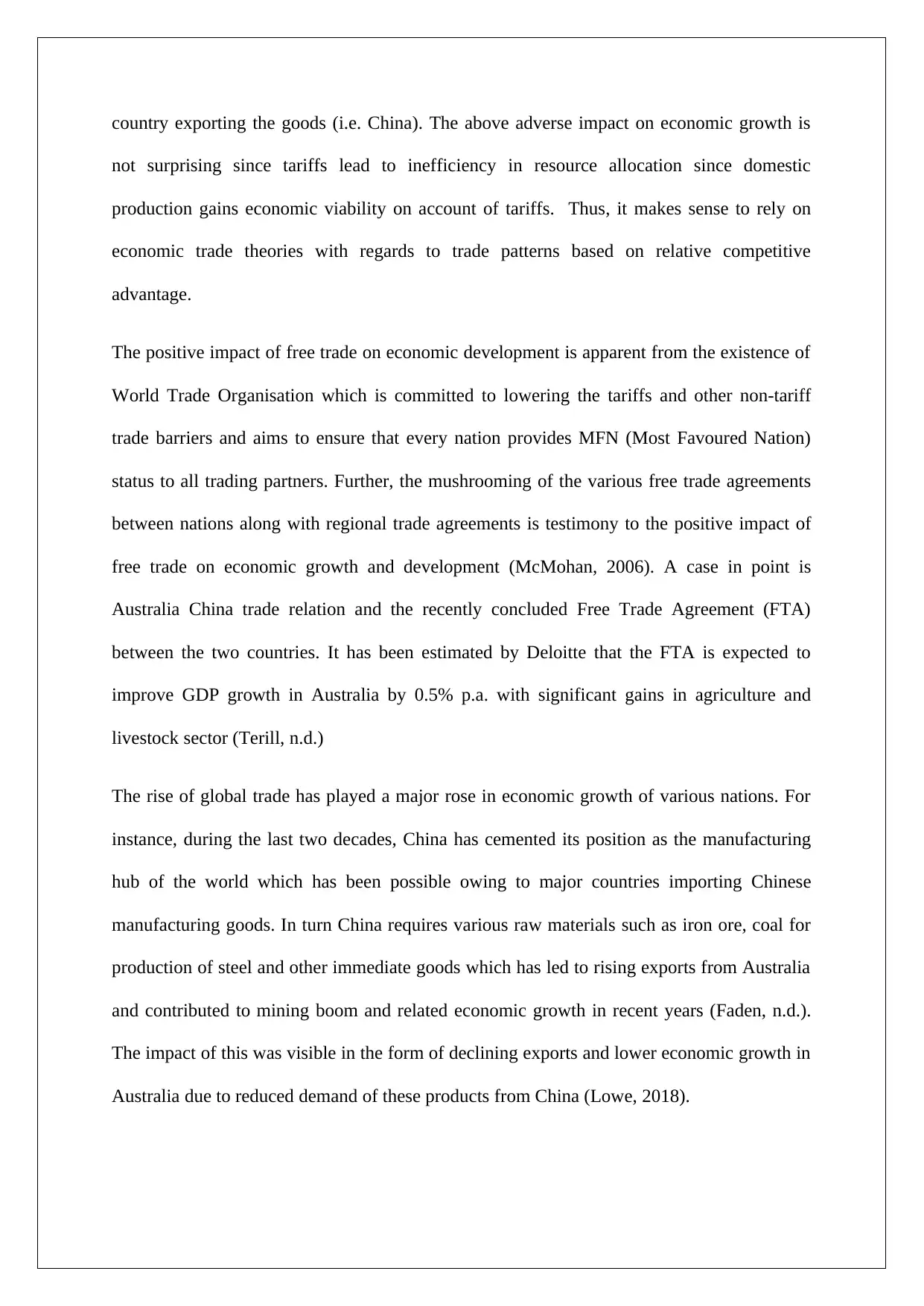
country exporting the goods (i.e. China). The above adverse impact on economic growth is
not surprising since tariffs lead to inefficiency in resource allocation since domestic
production gains economic viability on account of tariffs. Thus, it makes sense to rely on
economic trade theories with regards to trade patterns based on relative competitive
advantage.
The positive impact of free trade on economic development is apparent from the existence of
World Trade Organisation which is committed to lowering the tariffs and other non-tariff
trade barriers and aims to ensure that every nation provides MFN (Most Favoured Nation)
status to all trading partners. Further, the mushrooming of the various free trade agreements
between nations along with regional trade agreements is testimony to the positive impact of
free trade on economic growth and development (McMohan, 2006). A case in point is
Australia China trade relation and the recently concluded Free Trade Agreement (FTA)
between the two countries. It has been estimated by Deloitte that the FTA is expected to
improve GDP growth in Australia by 0.5% p.a. with significant gains in agriculture and
livestock sector (Terill, n.d.)
The rise of global trade has played a major rose in economic growth of various nations. For
instance, during the last two decades, China has cemented its position as the manufacturing
hub of the world which has been possible owing to major countries importing Chinese
manufacturing goods. In turn China requires various raw materials such as iron ore, coal for
production of steel and other immediate goods which has led to rising exports from Australia
and contributed to mining boom and related economic growth in recent years (Faden, n.d.).
The impact of this was visible in the form of declining exports and lower economic growth in
Australia due to reduced demand of these products from China (Lowe, 2018).
not surprising since tariffs lead to inefficiency in resource allocation since domestic
production gains economic viability on account of tariffs. Thus, it makes sense to rely on
economic trade theories with regards to trade patterns based on relative competitive
advantage.
The positive impact of free trade on economic development is apparent from the existence of
World Trade Organisation which is committed to lowering the tariffs and other non-tariff
trade barriers and aims to ensure that every nation provides MFN (Most Favoured Nation)
status to all trading partners. Further, the mushrooming of the various free trade agreements
between nations along with regional trade agreements is testimony to the positive impact of
free trade on economic growth and development (McMohan, 2006). A case in point is
Australia China trade relation and the recently concluded Free Trade Agreement (FTA)
between the two countries. It has been estimated by Deloitte that the FTA is expected to
improve GDP growth in Australia by 0.5% p.a. with significant gains in agriculture and
livestock sector (Terill, n.d.)
The rise of global trade has played a major rose in economic growth of various nations. For
instance, during the last two decades, China has cemented its position as the manufacturing
hub of the world which has been possible owing to major countries importing Chinese
manufacturing goods. In turn China requires various raw materials such as iron ore, coal for
production of steel and other immediate goods which has led to rising exports from Australia
and contributed to mining boom and related economic growth in recent years (Faden, n.d.).
The impact of this was visible in the form of declining exports and lower economic growth in
Australia due to reduced demand of these products from China (Lowe, 2018).
⊘ This is a preview!⊘
Do you want full access?
Subscribe today to unlock all pages.

Trusted by 1+ million students worldwide
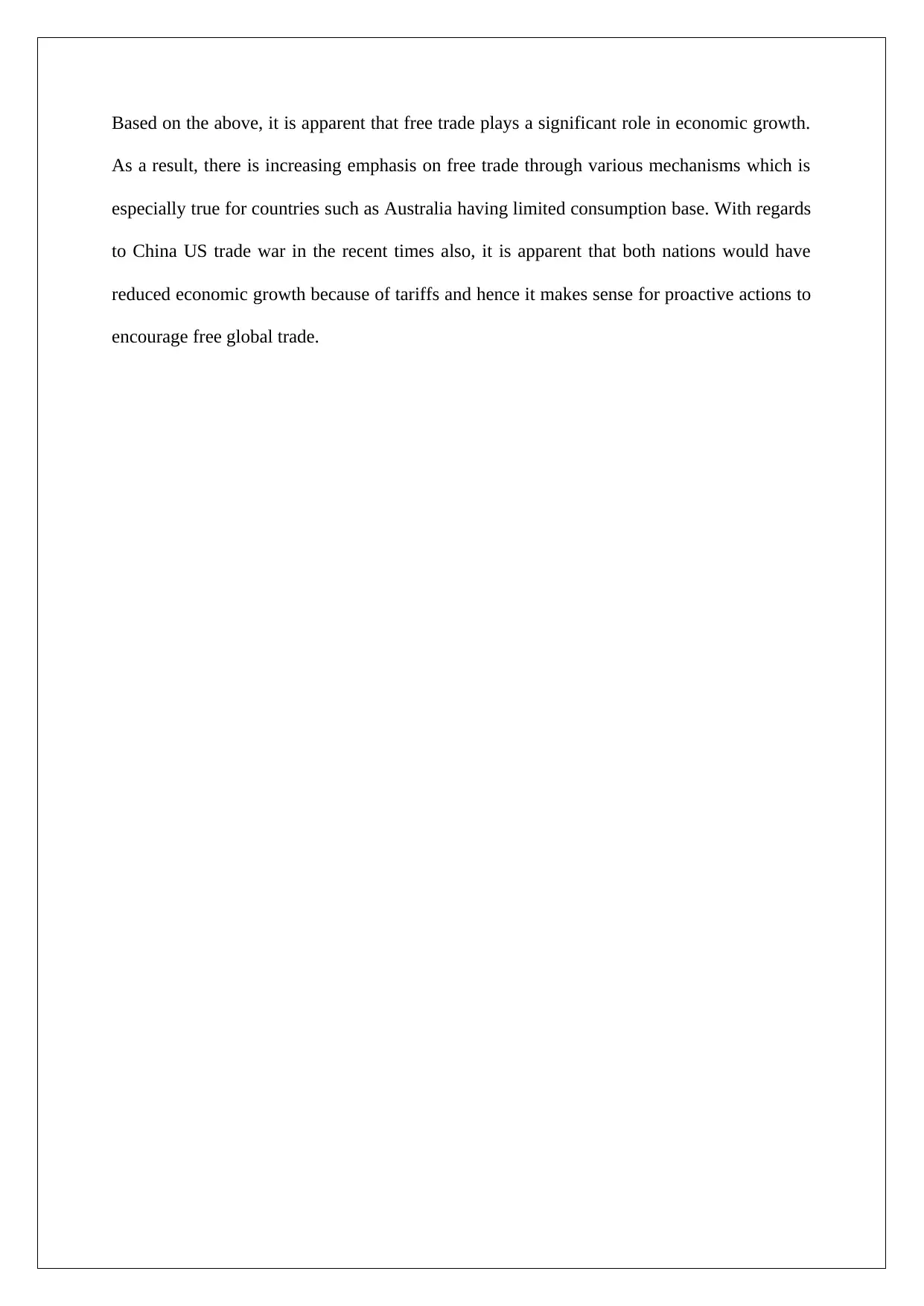
Based on the above, it is apparent that free trade plays a significant role in economic growth.
As a result, there is increasing emphasis on free trade through various mechanisms which is
especially true for countries such as Australia having limited consumption base. With regards
to China US trade war in the recent times also, it is apparent that both nations would have
reduced economic growth because of tariffs and hence it makes sense for proactive actions to
encourage free global trade.
As a result, there is increasing emphasis on free trade through various mechanisms which is
especially true for countries such as Australia having limited consumption base. With regards
to China US trade war in the recent times also, it is apparent that both nations would have
reduced economic growth because of tariffs and hence it makes sense for proactive actions to
encourage free global trade.
Paraphrase This Document
Need a fresh take? Get an instant paraphrase of this document with our AI Paraphraser
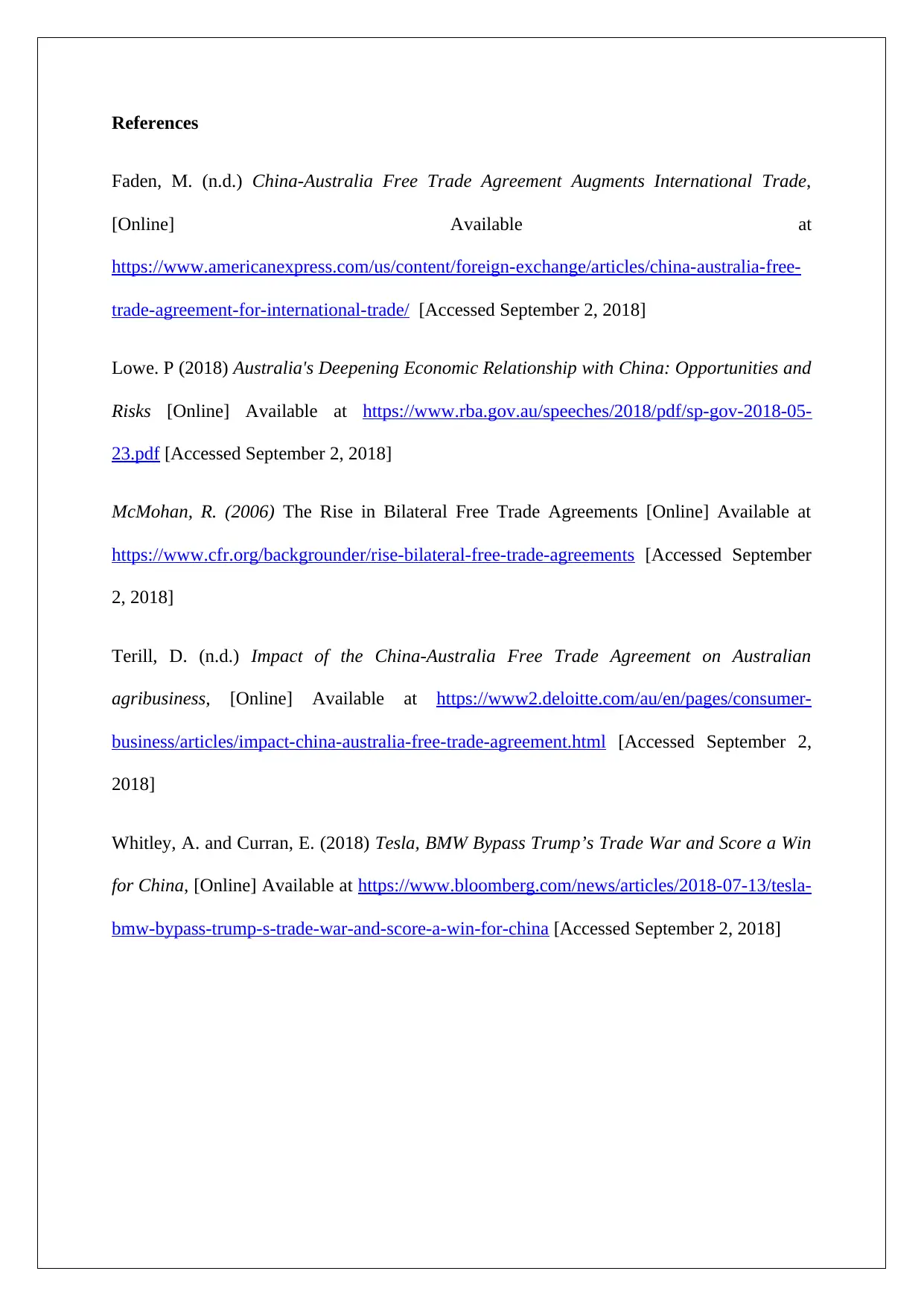
References
Faden, M. (n.d.) China-Australia Free Trade Agreement Augments International Trade,
[Online] Available at
https://www.americanexpress.com/us/content/foreign-exchange/articles/china-australia-free-
trade-agreement-for-international-trade/ [Accessed September 2, 2018]
Lowe. P (2018) Australia's Deepening Economic Relationship with China: Opportunities and
Risks [Online] Available at https://www.rba.gov.au/speeches/2018/pdf/sp-gov-2018-05-
23.pdf [Accessed September 2, 2018]
McMohan, R. (2006) The Rise in Bilateral Free Trade Agreements [Online] Available at
https://www.cfr.org/backgrounder/rise-bilateral-free-trade-agreements [Accessed September
2, 2018]
Terill, D. (n.d.) Impact of the China-Australia Free Trade Agreement on Australian
agribusiness, [Online] Available at https://www2.deloitte.com/au/en/pages/consumer-
business/articles/impact-china-australia-free-trade-agreement.html [Accessed September 2,
2018]
Whitley, A. and Curran, E. (2018) Tesla, BMW Bypass Trump’s Trade War and Score a Win
for China, [Online] Available at https://www.bloomberg.com/news/articles/2018-07-13/tesla-
bmw-bypass-trump-s-trade-war-and-score-a-win-for-china [Accessed September 2, 2018]
Faden, M. (n.d.) China-Australia Free Trade Agreement Augments International Trade,
[Online] Available at
https://www.americanexpress.com/us/content/foreign-exchange/articles/china-australia-free-
trade-agreement-for-international-trade/ [Accessed September 2, 2018]
Lowe. P (2018) Australia's Deepening Economic Relationship with China: Opportunities and
Risks [Online] Available at https://www.rba.gov.au/speeches/2018/pdf/sp-gov-2018-05-
23.pdf [Accessed September 2, 2018]
McMohan, R. (2006) The Rise in Bilateral Free Trade Agreements [Online] Available at
https://www.cfr.org/backgrounder/rise-bilateral-free-trade-agreements [Accessed September
2, 2018]
Terill, D. (n.d.) Impact of the China-Australia Free Trade Agreement on Australian
agribusiness, [Online] Available at https://www2.deloitte.com/au/en/pages/consumer-
business/articles/impact-china-australia-free-trade-agreement.html [Accessed September 2,
2018]
Whitley, A. and Curran, E. (2018) Tesla, BMW Bypass Trump’s Trade War and Score a Win
for China, [Online] Available at https://www.bloomberg.com/news/articles/2018-07-13/tesla-
bmw-bypass-trump-s-trade-war-and-score-a-win-for-china [Accessed September 2, 2018]
1 out of 5
Related Documents
Your All-in-One AI-Powered Toolkit for Academic Success.
+13062052269
info@desklib.com
Available 24*7 on WhatsApp / Email
![[object Object]](/_next/static/media/star-bottom.7253800d.svg)
Unlock your academic potential
Copyright © 2020–2026 A2Z Services. All Rights Reserved. Developed and managed by ZUCOL.





